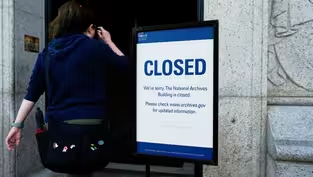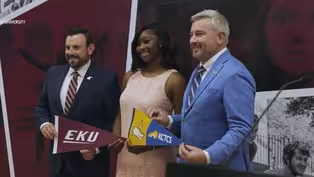
Digging for Answers to Civil War Massacre
Clip: Season 4 Episode 68 | 4m 8sVideo has Closed Captions
Team digs at site where 22 black Civil War soldiers believed to be massacred.
Local archaeologists and historians were at a farm in Simpsonville Monday, where they dug up earth, trying to locate the bodies of 22 soldiers with the 5th U.S. Colored Cavalry, who were massacred during the Civil War.
Problems playing video? | Closed Captioning Feedback
Problems playing video? | Closed Captioning Feedback
Kentucky Edition is a local public television program presented by KET

Digging for Answers to Civil War Massacre
Clip: Season 4 Episode 68 | 4m 8sVideo has Closed Captions
Local archaeologists and historians were at a farm in Simpsonville Monday, where they dug up earth, trying to locate the bodies of 22 soldiers with the 5th U.S. Colored Cavalry, who were massacred during the Civil War.
Problems playing video? | Closed Captioning Feedback
How to Watch Kentucky Edition
Kentucky Edition is available to stream on pbs.org and the free PBS App, available on iPhone, Apple TV, Android TV, Android smartphones, Amazon Fire TV, Amazon Fire Tablet, Roku, Samsung Smart TV, and Vizio.
Providing Support for PBS.org
Learn Moreabout PBS online sponsorshipKentucky Farm could hold the key to a mystery dating back to the Civil War.
22 soldiers with the fifth U.S.
colored Calvary.
Many formerly enslaved were attacked and killed by Confederate guerillas while on their way to Louisville.
Their bodies were never found.
Local archeologists and historians began their search almost 20 years ago, a search that brought them to a farm in Simpsonville Monday where they dug up Earth, trying to uncover some answers.
Right now is the culmination of about 18 years of research and work here.
We are looking for the remains of 22 men from the fifth United States colored Cavalry company who were killed in January 25th, 1865, by elders.
They would talk about it.
My grandfather, he was born in 1989, is.
And his actual father.
They had uncle lived here.
They didn't watch the battle, but they were aware of the commotion.
He actually what I've understood knew where the burial site may be.
But as time went by, our memories faded.
I would just wish I had been able to talk.
Had sense enough to have thought when I was a kid, as my grandfather would tell.
You can show me pretty much exactly where the place is.
But see, my father and I, neither one of us did that.
So, like I say, it was all it was lost.
Kentucky Archeology survey is here.
There are some forensic archeologists there looking for buttons.
Could be leather from boots if their boats weren't stolen.
Could be teeth.
Could be bones.
A couple of years ago, Jerry reached out to me again, said that he had found in the archives a 1936 highway map that was marked Civil War burial mound.
And it was right out here in this field.
We're just not seeing those soil differences we expect to find.
And since we know that there are at least 22 men that are buried here, the number of trenches we put across there, we would have found at least some soil difference, even if we didn't find human remains or buttons, we would have seen the soil changes that would have let us know that there was a burial trench there.
The fact that they're not there, it's a little disappointing, but we're not going to give up.
We're going to continue this process.
We know they should be somewhere between the top of this hill and the bottom of the soil.
So we may do some additional geophysics there.
Some other places in the cemetery where he didn't look.
We have some newer technologies we might try to take into the cemetery to look and go from there.
The process is that if we verify if the archeologists verified that these are human remains, the remains will be reinterred.
At the National Cemetery at Camp Nelson in Jessamine county, so they can be properly memorialized with military honors because they died for their country.
They not only did they die for their freedom because virtually all of them were enslaved and they went to the recruiting office either in Louisville or in Camp Nelson in Jessamine County and enlisted.
And they got their freedom when they took that oath of the military.
And eventually they would have got the freedom of their loved ones as well.
These soldiers deserve the right to be buried properly.
And the recognition, like any other soldier, whether it be from Vietnam, Korea, second, first World War, they deserve.
They were your federal soldiers.
They deserve just as much respect as any other soldier of the United States.
I want them to know that we will continue to look for them to tell their stories, and we won't leave them behind, at least as long as I am around.
We will continue to try to find these men so we can tell their stories.
The PBS series Secrets of the Dead featured a story on the Simpsonville massacre that it was co-produced by Katie.
You can see that episode by streaming it online on demand at Katie Dawg.
Slash Program Slash Secrets of the Dead.
Impact of Government Shutdown on Kentucky
Video has Closed Captions
Clip: S4 Ep68 | 3m 27s | What the government shutdown means for Kentucky. (3m 27s)
Kentucky’s Top Doctor on Tylenol-Autism Controversy
Video has Closed Captions
Clip: S4 Ep68 | 8m 46s | Dr. Steven Stack responds to Trump administration tying Tylenol to autism. (8m 46s)
Partnership Expected to Make College Easier, More Affordable
Video has Closed Captions
Clip: S4 Ep68 | 3m 21s | KCTCS and EKU say partnership will make it easier for students to continue education. (3m 21s)
Providing Support for PBS.org
Learn Moreabout PBS online sponsorship
- News and Public Affairs

Top journalists deliver compelling original analysis of the hour's headlines.

- News and Public Affairs

FRONTLINE is investigative journalism that questions, explains and changes our world.












Support for PBS provided by:
Kentucky Edition is a local public television program presented by KET


